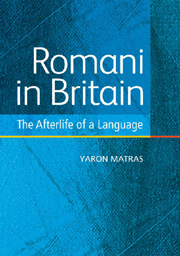Book contents
- Frontmatter
- Contents
- List of Figures, Tables and Maps
- List of Abbreviations
- Preface
- 1 Angloromani: A Different Kind of Language?
- 2 The Roots of Romani
- 3 The Historical Position of British Romani
- 4 The Structural Composition of Angloromani
- 5 The Conversational Functions of Angloromani
- 6 Conclusions: The Decline, Death and Afterlife of a Language
- Appendix I Lexicon of Angloromani
- Appendix II Predecessor expressions by origin
- References
- Author Index
- Subject Index
Preface
Published online by Cambridge University Press: 12 September 2012
- Frontmatter
- Contents
- List of Figures, Tables and Maps
- List of Abbreviations
- Preface
- 1 Angloromani: A Different Kind of Language?
- 2 The Roots of Romani
- 3 The Historical Position of British Romani
- 4 The Structural Composition of Angloromani
- 5 The Conversational Functions of Angloromani
- 6 Conclusions: The Decline, Death and Afterlife of a Language
- Appendix I Lexicon of Angloromani
- Appendix II Predecessor expressions by origin
- References
- Author Index
- Subject Index
Summary
British Romanies are very much aware of a ‘lost’ form of language that was once used for a wide range of conversational functions within their community. Romani had been one of the minority languages of Britain for over four hundred years. It has even left a legacy within English in the form of Romani-origin colloquial words like pal, chavvy, mush, minge and kushti as well as regionalisms like gaji, nash, peeve, ladj and yocks. Its decline as the everyday language of the Romani community took place during the nineteenth century, when other languages of the British Isles were also being abandoned in favour of English. However, in a way Romani has actually survived the process of language death and now enjoys a kind of linguistic ‘afterlife’: Romanies in Britain continue to use a variety of speech which they refer to as Rommanis, Romimus, Romani Jibb ‘the Romani language’, or sometimes Poggaddi Jibb ‘the broken language’. Researchers have labelled it ‘Angloromani’. Broadly speaking, this form of speech consists of embedding a special lexical reservoir, largely derived from Romani, into English conversation. Along with this reservoir come certain word-formation techniques for enriching the lexicon as well as various stylistic and some structural particularities. Contemporary Angloromani thus remains the living speech variety of one of Britain's oldest and most established ethnic minorities.
- Type
- Chapter
- Information
- Romani in BritainThe Afterlife of a Language, pp. xi - xviPublisher: Edinburgh University PressPrint publication year: 2010



